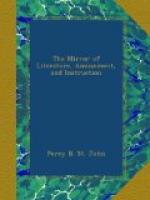* * * * *
PUBLIC CREDIT.
It is physically impossible to carry on the commerce of the civilized world by the aid of a purely metallic currency—no, not though our gold and silver coins were every tenth year debased to a tenth! Why, in London alone, five millions of money are daily exchanged at the Clearing-house, in the course of a few hours. We should like to see the attempt made to bring this infinity of transactions to a settlement in coined money. Credit money, in some shape or other, always has, and must have, performed the part of a circulating medium to a very considerable extent. And (by one of those wonderful compensatory processes which so frequently claim the admiration of every investigator of civil, as well as of physical economy) there is in the nature of credit an elasticity which causes it, when left unshackled by law, to adapt itself to the necessities of commerce, and the legitimate demands of the market. Well may the productive classes exclaim to those who persist in legislating on the subject, and are not content without determining who may, and who may not, give credit to another, what kind of monied obligations shall, or shall not, be allowed to circulate—that is, to be taken in exchange for goods at the option of the parties—well might they exclaim, as the merchants of Paris did to the minister of Louis, when he asked what his master could do for them—“Laissez nous faire,”—“Leave us alone, to surround ourselves with those precautions which experience will suggest and the instinct of self-preservation put in execution.”—Ibid.
* * * * *




